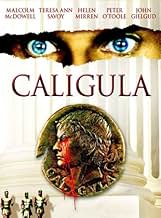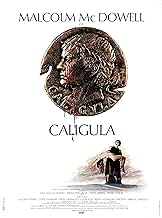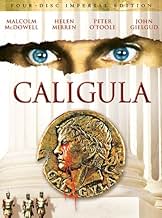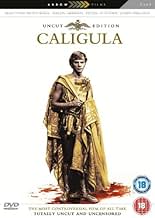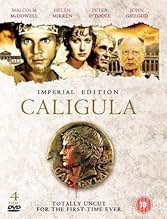Detalla la historia impactante, pero innegablemente trágica, del césar más infame de Roma, Calígula.Detalla la historia impactante, pero innegablemente trágica, del césar más infame de Roma, Calígula.Detalla la historia impactante, pero innegablemente trágica, del césar más infame de Roma, Calígula.
- Dirección
- Guión
- Reparto principal
- Premios
- 1 premio y 2 nominaciones en total
Mirella D'Angelo
- Livia
- (as Mirella Dangelo)
Rick Parets
- Mnester
- (as Richard Parets)
Pola Muzyka
- Subura Singer
- (as Paula Mitchell)
Joss Ackland
- Chaerea
- (English version)
- (voz)
- (sin acreditar)
Reseñas destacadas
Let's not kid ourselves here, all ye art students, film-school nerds, and other self-loathing "cinema l'arte" snobs: had this exact same movie been released under the banner "directed by Pier Paolo Pasolini" you would have loved it - sorry: CLAIMED to have loved it - and praised it to high heaven, espousing its virtues in long essays, justifying its extreme sex and violence through some b.s. semantic pseudo-intellectual movie-critic-jargon mumbo-jumbo.
Go on, admit it. No-one will laugh. We promise.
This movie has been unanimously dismissed as exploitative trash and of no cinematic value by "notable" movie critics.
After having seen the full two-and-a-half hour version: a) I can certainly see why THEY would choose to view it that way b) I totally disagree The fact that "Caligula" was financed by Penthouse (gasp!) and directed by Tinto Brass (oh no!) is what this is all about.
An excellent cast includes McDowell (an ideal choice for Caligula - or any devious lunatic, for that matter) and Mirren (at the height of her enormous sex-appeal). There is terrific music from Khachaturian, an interesting story, some suspense, etc. A strong stomach is needed to watch this gore-fest, though.
A corny, historically inaccurate, fairy-tale-like piece of crap like "Gandhi" gets world-wide recognition, while a brutally realistic film about another historical figure gets the finger. Go figure.
Go on, admit it. No-one will laugh. We promise.
This movie has been unanimously dismissed as exploitative trash and of no cinematic value by "notable" movie critics.
After having seen the full two-and-a-half hour version: a) I can certainly see why THEY would choose to view it that way b) I totally disagree The fact that "Caligula" was financed by Penthouse (gasp!) and directed by Tinto Brass (oh no!) is what this is all about.
An excellent cast includes McDowell (an ideal choice for Caligula - or any devious lunatic, for that matter) and Mirren (at the height of her enormous sex-appeal). There is terrific music from Khachaturian, an interesting story, some suspense, etc. A strong stomach is needed to watch this gore-fest, though.
A corny, historically inaccurate, fairy-tale-like piece of crap like "Gandhi" gets world-wide recognition, while a brutally realistic film about another historical figure gets the finger. Go figure.
For a period there, in the late 70s, we came very close to having real life in films. More real than ever. Oh, we had blood and tears, and an occasional breast, but the state of affairs was little different than that Disney TeeVee world where no bathrooms had toilets and sex was something oddly remote from the eye, always around the corner.
Partly, its that odd, odd American prudishness, that tut tut notion that invisible things are managed things. But partly there's the simple fact that no good case could be made for "watching." So a simple balance is maintained. Since sex sells, we'll have wet lips and vamping and wild joining of invisible parts. But we won't have life the way it really is, with all sorts of skin, intimacies and gentle touches. And smells.
Into this space you'll find various intrusions. I really thought "9 Songs" was immensely clever, justifiably cinematic. I also find from time to time clever ideas in ordinary porn. "Private Teacher" by an Orson Welles associate had some neat ideas sneaked in, as did "La Foire aux sexes" which was every bit a good new wave film.
And then you'll have something like this, which perhaps by itself set back the whole notion of intimacy in film three decades.
Its big, its loud, its stupid. Fortunately, this was before that insane silicone and shaved craze hit the girlie watcher's world. But its of the same ilk in a way.
Just think: Peter O'Toole, Hellen Mirren, John Geilgud for chrissakes! Not bad set design, in that Italian monstrosity tradition of Zefferelli. A script by Gore Vidal who knows nothing about how to flesh out a film (ouch, sorry), but whose larger arcs are solid. And Tinto Brass is not a bad filmmaker in the small, meaning he knows how to make a good image if not craft things as a project.
It could have worked, because by the late seventies, audiences had plenty of examples of performances that referenced and encapsulated other performances, so we could have what this could have been: a (film) performance of a (porn) performance of a (historical, voyeuristic-in-its-time) performance. And the projection of genital reality across those layers could have been intelligent as well as whatever else you may want.
For decades after Kinsey botched things with flawed science, Playboy was the vanguard of the sexual revolution. I'm not making this up; there really was a "Playboy philosophy" which boiled down to: "sex is natural and pleasant and if it doesn't hurt anyone, why not?" With hippies as a sort of mascot, this seemed intelligent, especially since the girlie pictures were surrounded with some of the best writing in print. Those centerfolds mattered.
Then along came a sort of second generation magazine which exploited the fact that Palyboy's girls had no body hair or genitals and were too linked to a set of obsolete fantasies. Penthouse girls had hair and fluids and were aggressive. Fewer coy blonds; more adventure. It was an equally vapid set of fantasies which as these things go went obsolete as quickly. But in the period of 76-80, that magazine was in the forefront of vaginal honesty in life. A forefront, such as society would allow.
And there was the Playboy tradition of wrapping things in intellectual goo. Which meant that this film could have been something that mattered, that changed things. It could have cast itself in the same useless space as the Romans it portrayed. But it made a strange bargain: the story has these acts as perverted, distorted life. Where ordinary films went way out of their way to not show certain things in sex, this went as far the other way to show them. Its a strange world where sexual positions and acts are arranged precisely so that you CAN see.
So I think like all great turning points in film, this film is important. Its not good, its ghastly. But its important because its mistakes hurt us in places that matter and missed an opportunity to make film better, richer.
Ted's Evaluation -- 1 of 3: You can find something better to do with this part of your life.
Partly, its that odd, odd American prudishness, that tut tut notion that invisible things are managed things. But partly there's the simple fact that no good case could be made for "watching." So a simple balance is maintained. Since sex sells, we'll have wet lips and vamping and wild joining of invisible parts. But we won't have life the way it really is, with all sorts of skin, intimacies and gentle touches. And smells.
Into this space you'll find various intrusions. I really thought "9 Songs" was immensely clever, justifiably cinematic. I also find from time to time clever ideas in ordinary porn. "Private Teacher" by an Orson Welles associate had some neat ideas sneaked in, as did "La Foire aux sexes" which was every bit a good new wave film.
And then you'll have something like this, which perhaps by itself set back the whole notion of intimacy in film three decades.
Its big, its loud, its stupid. Fortunately, this was before that insane silicone and shaved craze hit the girlie watcher's world. But its of the same ilk in a way.
Just think: Peter O'Toole, Hellen Mirren, John Geilgud for chrissakes! Not bad set design, in that Italian monstrosity tradition of Zefferelli. A script by Gore Vidal who knows nothing about how to flesh out a film (ouch, sorry), but whose larger arcs are solid. And Tinto Brass is not a bad filmmaker in the small, meaning he knows how to make a good image if not craft things as a project.
It could have worked, because by the late seventies, audiences had plenty of examples of performances that referenced and encapsulated other performances, so we could have what this could have been: a (film) performance of a (porn) performance of a (historical, voyeuristic-in-its-time) performance. And the projection of genital reality across those layers could have been intelligent as well as whatever else you may want.
For decades after Kinsey botched things with flawed science, Playboy was the vanguard of the sexual revolution. I'm not making this up; there really was a "Playboy philosophy" which boiled down to: "sex is natural and pleasant and if it doesn't hurt anyone, why not?" With hippies as a sort of mascot, this seemed intelligent, especially since the girlie pictures were surrounded with some of the best writing in print. Those centerfolds mattered.
Then along came a sort of second generation magazine which exploited the fact that Palyboy's girls had no body hair or genitals and were too linked to a set of obsolete fantasies. Penthouse girls had hair and fluids and were aggressive. Fewer coy blonds; more adventure. It was an equally vapid set of fantasies which as these things go went obsolete as quickly. But in the period of 76-80, that magazine was in the forefront of vaginal honesty in life. A forefront, such as society would allow.
And there was the Playboy tradition of wrapping things in intellectual goo. Which meant that this film could have been something that mattered, that changed things. It could have cast itself in the same useless space as the Romans it portrayed. But it made a strange bargain: the story has these acts as perverted, distorted life. Where ordinary films went way out of their way to not show certain things in sex, this went as far the other way to show them. Its a strange world where sexual positions and acts are arranged precisely so that you CAN see.
So I think like all great turning points in film, this film is important. Its not good, its ghastly. But its important because its mistakes hurt us in places that matter and missed an opportunity to make film better, richer.
Ted's Evaluation -- 1 of 3: You can find something better to do with this part of your life.
Where to start..... First off, the sets are wonderful. They are lavish and look authentic of the time, except as if a madman on acid was given a gigantic budget and told to "go at it!" Peter O'Toole is wonderful as the aging Tiberius. Malcolm McDowell gives a great performance as the young Caligula who kills his way to the throne of the Roman Emperor and then soon leads a legacy of terror. The supporting actors do a fine job yet, most of the young ladies were actually Penthouse Pets and were there for eye candy and irrelevant sex scenes. Depending on which film you are watching, the uncut or the R-version, some scenes are extremely graphic. I would usually always recommend the uncut version as opposed to the chopped one, but in this instance, the full length film is purely indulgent. Scenes of sex and gore were added to satisfy the producers (Penthouse) and the expected audience, not to add anything to the story. However, I am and will always be a fan of excess, so get the full version! The story is strong and keeps you interested. McDowell is charming throughout, which is quite the feat considering he murders family members, rapes and molests men and women, and sleeps with his sister. For fans of excess and sleaze, i highly recommend. Viewers who are purely interested in the reign of the notorious ruler might want to skip this one.
I watched this movie the first time the night-before last.. and watched it again last night and again tonight.
This movie is far from pornography... only a few scenes are hardcore, and only a couple of these are even barely erotic. It does not exactly function as an historical epic, either.
The film quality and lighting would make it appear to date from the 1960s.
The script is mediocre. More drama could be added, however we do have to bear in mind that the Romans followed the school of Stoicism.
The acting (including Malcolm McDowell's) is nothing outstanding, with the exception of Peter O'Toole's Tiberius Caesar. He displays tragedy and lunacy, evoking reactions of disgust, sympathy, pity, and compassion. I found myself much more intrigued by his character and wishing the movie was about his decline from wisdom to near-madness, rather than Caligula. It also caused me to desire to learn more and research the actual life of Tiberius.
The film neither condemns, nor condones. That is probably how it should be.
Where this film succeeds monumentally is the costuming and unabridged realism. This is the first film I've seen to have a character wearing a toga like the one Caligula's sister (a design many Roman women actually wore) wears in the opening scene. The depiction of slaves and the acts of love and brutality are well-done. It is not erotic, it is not horrifying. With the hardcore scenes excised (the version i saw was the complete version), I believe this movie should be shown in every high school World History class. For centuries, Western culture has censored and toned-down representations of its Pagan past. The filmmakers must be applauded for attempting to make an honest epic.
I've become very hard to please when it comes to movies. The last movie I actually liked to a strong degree was Amadeus, which I saw two years ago. Despite its flaws, with its sheer amount of action and atmosphere, I believe this movie deserves a 10.
This movie is far from pornography... only a few scenes are hardcore, and only a couple of these are even barely erotic. It does not exactly function as an historical epic, either.
The film quality and lighting would make it appear to date from the 1960s.
The script is mediocre. More drama could be added, however we do have to bear in mind that the Romans followed the school of Stoicism.
The acting (including Malcolm McDowell's) is nothing outstanding, with the exception of Peter O'Toole's Tiberius Caesar. He displays tragedy and lunacy, evoking reactions of disgust, sympathy, pity, and compassion. I found myself much more intrigued by his character and wishing the movie was about his decline from wisdom to near-madness, rather than Caligula. It also caused me to desire to learn more and research the actual life of Tiberius.
The film neither condemns, nor condones. That is probably how it should be.
Where this film succeeds monumentally is the costuming and unabridged realism. This is the first film I've seen to have a character wearing a toga like the one Caligula's sister (a design many Roman women actually wore) wears in the opening scene. The depiction of slaves and the acts of love and brutality are well-done. It is not erotic, it is not horrifying. With the hardcore scenes excised (the version i saw was the complete version), I believe this movie should be shown in every high school World History class. For centuries, Western culture has censored and toned-down representations of its Pagan past. The filmmakers must be applauded for attempting to make an honest epic.
I've become very hard to please when it comes to movies. The last movie I actually liked to a strong degree was Amadeus, which I saw two years ago. Despite its flaws, with its sheer amount of action and atmosphere, I believe this movie deserves a 10.
Some describe CALIGULIA as "the" most controversial film of its era. While this is debatable, it is certainly one of the most embarrassing: virtually every big name associated with the film made an effort to distance themselves from it. Author Gore Vidal actually sued (with mixed results) to have his name removed from the film, and when the stars saw the film their reactions varied from loudly voiced disgust to strategic silence. What they wanted, of course, was for it to go away.
For a while it looked like it might. CALIGULA was a major box-office and critical flop (producer Guccione had to rent theatres in order to get it screened at all), and although the film was released on VHS to the home market so many censorship issues were raised that it was re-edited, and the edited version was the only one widely available for more than a decade. But now CALIGULIA is on DVD, available in both edited "R" and original "Unrated" versions. And no doubt John Gielgud is glad he didn't live to see it happen.
The only way to describe CALIGULIA is to say it is something like DEEP THROAT meets David Lynch's DUNE by way of Fellini having an off day. Vidal's script fell into the hands of Penthouse publisher Bob Guccione, who used Vidal's reputation to bankroll the project and lure the big name stars--and then threw out most of Vidal's script and brought in soft-porn director Tinto Brass. Then, when Guccione felt Brass' work wasn't explicit enough, he and Giancarlo Lui photographed hardcore material on the sly.
Viewers watching the edited version may wonder what all the fuss is about, but those viewing the original cut will quickly realize that it leaves absolutely nothing to the imagination. There is a tremendous amount of nudity, and that remains in the edited version, but the original comes complete with XXX scenes: there is very explicit gay, lesbian, and straight sex, kinky sex, and a grand orgy complete with dancing Roman guards thrown in for good measure. The film is also incredibly violent and bloody, with rape, torture, and mutilation the order of the day. In one particularly disturbing scene, a man is slowly stabbed to death, a woman urinates on his corpse, and his genitals are cut off and thrown to the dogs.
In a documentary that accompanies the DVD release, Guccione states he wanted the film to reflect the reality of pagan Rome. If so, he missed the mark. We know very little about Caligula--and what little we know is questionable at best. That aside, orgies and casual sex were not a commonplace of Roman society, where adultery was an offense punishable by death. And certainly ancient Rome NEVER looked like the strange, slightly Oriental, oddly space-age sets and costumes offered by the designers.
On the plus side, those sets and costumes are often fantastically beautiful, and although the cinematography is commonplace it at least does them justice; the score is also very, very good. The most successful member of the cast is Helen Mirren, who manages to engage our interests and sympathies as the Empress Caesonia; Gielgud and O'Toole also escape in reasonably good form. The same cannot be said for McDowell, but in justice to him he doesn't have much to work with.
The movie does possess a dark fascination, but ultimately it is an oddity, more interesting for its design and flat-out weirdness than for content. Some of the bodies on display (including McDowell's and Mirren's) are extremely beautiful, and some of the sex scenes work very well as pornography... but then again, some of them are so distasteful they might drive you to abstinence, and the bloody and grotesque nature of the film undercuts its eroticism. If you're up to it, it is worth seeing once, but once is likely to be enough.
Gary F. Taylor, aka GFT, Amazon Reviewer
For a while it looked like it might. CALIGULA was a major box-office and critical flop (producer Guccione had to rent theatres in order to get it screened at all), and although the film was released on VHS to the home market so many censorship issues were raised that it was re-edited, and the edited version was the only one widely available for more than a decade. But now CALIGULIA is on DVD, available in both edited "R" and original "Unrated" versions. And no doubt John Gielgud is glad he didn't live to see it happen.
The only way to describe CALIGULIA is to say it is something like DEEP THROAT meets David Lynch's DUNE by way of Fellini having an off day. Vidal's script fell into the hands of Penthouse publisher Bob Guccione, who used Vidal's reputation to bankroll the project and lure the big name stars--and then threw out most of Vidal's script and brought in soft-porn director Tinto Brass. Then, when Guccione felt Brass' work wasn't explicit enough, he and Giancarlo Lui photographed hardcore material on the sly.
Viewers watching the edited version may wonder what all the fuss is about, but those viewing the original cut will quickly realize that it leaves absolutely nothing to the imagination. There is a tremendous amount of nudity, and that remains in the edited version, but the original comes complete with XXX scenes: there is very explicit gay, lesbian, and straight sex, kinky sex, and a grand orgy complete with dancing Roman guards thrown in for good measure. The film is also incredibly violent and bloody, with rape, torture, and mutilation the order of the day. In one particularly disturbing scene, a man is slowly stabbed to death, a woman urinates on his corpse, and his genitals are cut off and thrown to the dogs.
In a documentary that accompanies the DVD release, Guccione states he wanted the film to reflect the reality of pagan Rome. If so, he missed the mark. We know very little about Caligula--and what little we know is questionable at best. That aside, orgies and casual sex were not a commonplace of Roman society, where adultery was an offense punishable by death. And certainly ancient Rome NEVER looked like the strange, slightly Oriental, oddly space-age sets and costumes offered by the designers.
On the plus side, those sets and costumes are often fantastically beautiful, and although the cinematography is commonplace it at least does them justice; the score is also very, very good. The most successful member of the cast is Helen Mirren, who manages to engage our interests and sympathies as the Empress Caesonia; Gielgud and O'Toole also escape in reasonably good form. The same cannot be said for McDowell, but in justice to him he doesn't have much to work with.
The movie does possess a dark fascination, but ultimately it is an oddity, more interesting for its design and flat-out weirdness than for content. Some of the bodies on display (including McDowell's and Mirren's) are extremely beautiful, and some of the sex scenes work very well as pornography... but then again, some of them are so distasteful they might drive you to abstinence, and the bloody and grotesque nature of the film undercuts its eroticism. If you're up to it, it is worth seeing once, but once is likely to be enough.
Gary F. Taylor, aka GFT, Amazon Reviewer
¿Sabías que...?
- CuriosidadesDame Helen Mirren described this movie as "an irresistible mix of art and genitals". Although many actors would regret their involvement with the film, Mirren has remained proud of her role as "the most promiscuous woman in all of Rome", as she believed European Cinema was reaching a benchmark in sex positivity and "it was the time to do nudity". She was, however, taken aback with the film's hardcore footage.
- PifiasCaligula squeezes a lemon over a captured slave. Lemons did not reach Europe until the 2nd century, at least 100 years after Caligula's death.
- Créditos adicionalesDue to numerous pending lawsuits and settlements at the time of the film's release, no one is technically fully credited for writing and directing the finished film.
- Versiones alternativasThe censored version of this film has been released of a few occasions in Australia. In March 1981, a censored, R rated release to cinemas was made by Roadshow. Roadshow Home Video subsequently released the same film version to video in September 1984. This version ran for 146 minutes (PAL). It was again re-released by a 'no name' video label in the late 1990's. The censored DVD version appeared in December 2004, released by Warner Vision. The uncut version has been released in Australia, this was the fully uncut, X rated 156 minute PAL version. It was released in January 1985 by 'Palace X Video' - a version that is now an extremely rare collector's item. The uncut version has since been rated R18+ by the Australian classification board in 2021.
- ConexionesEdited into Video Macumba (1991)
Selecciones populares
Inicia sesión para calificar y añadir a tu lista para recibir recomendaciones personalizadas
- How long is Caligula?Con tecnología de Alexa
- Does the edited R-rated version contain shots of the male anatomy or not? If so, wouldn't showing the male anatomy automatically guarantee an NC-17 or X rating?
- Is Bob Guccione the director?
- Did Gore Vidal disown the film because Bob Guccione and Tinto Brass added explicit sex and gore to the film?
Detalles
- Fecha de lanzamiento
- Países de origen
- Sitio oficial
- Idioma
- Títulos en diferentes países
- Caligula
- Localizaciones del rodaje
- Empresas productoras
- Ver más compañías en los créditos en IMDbPro
Taquilla
- Presupuesto
- 17.500.000 US$ (estimación)
- Recaudación en todo el mundo
- 90 US$
Contribuir a esta página
Sugerir un cambio o añadir el contenido que falta





